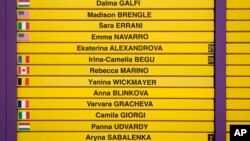This website uses cookies so that we can provide you with the best user experience possible. Cookie information is stored in your browser and performs functions such as recognising you when you return to our website and helping our team to understand which sections of the website you find most interesting and useful.

WIMBLEDON, ENGLAND — When Victoria Azarenka walked into Court 15 Monday morning for her first Wimbledon match in two years, she was greeted by polite clapping. When the two-time Grand Slam champion from Belarus finished off a three-set victory more than 2½ hours later, Azarenka shook her racket with her right hand and pumped her left fist, then offered a wave to the spectators who were applauding warmly.
Unlike her opponent, Yuan Yue, whose nationality was noted on the scoreboard alongside her name, Azarenka had no country listed there. That's because players from Russia and Belarus are back competing at Wimbledon a year after they were barred by the All England Club because of the invasion of Ukraine — and, in a sort of half-measure adopted by some other sports, are deemed “neutral” athletes who officially do not represent any nation.
The war that began in February 2022 when Russia invaded Ukraine with help from Belarus continues, but Wimbledon's organizers announced in March they would lift their ban — about which Azarenka said in an interview that, in the big picture, “I’m not sure that it made any difference.”
While other players have flags to the left of their names on the oversized, manually operated brackets on the outside wall of Center Court, the Russians and Belarusians do not. Nor are the countries noted on official schedules or results issued by the All England Club, nor as part of graphics on TV broadcasts of matches. The Club did not allow Wimbledon to be aired on television in Russia or Belarus.
Azarenka and all other entrants from those two countries needed to — and did — sign a declaration agreeing to three stipulations: They wouldn't be representing Russia or Belarus; they wouldn't accept funding from those governments or companies operated by them; they wouldn't express support for the invasion of Ukraine or the leaders of Russia or Belarus.
“It was a difficult decision, as we said when we made it earlier in the year,” All England Club CEO Sally Bolton said Monday about the reversal in policy. "We took a lot of time to think carefully about the decision we made and the impact that would have in the same way as we did last year. We think it's the right decision for The Championships this year.”
Liudmila Samsonova, a Russian who was seeded 15th in the women’s field, said after being eliminated by Ana Bogdan of Romania 7-6 (1), 7-6 (4) Monday: “Last year was tough to accept. But this year, when they said that we were able to play, it was amazing.”
If there were questions about how Russians and Belarusians might be received upon their return, the earliest indications on Day 1 were that there was nothing out of the ordinary.
No protests. No boos. No shouts in support of Ukraine — or against the returning players. (Russian and Belarusian flags were not allowed to be brought into the tournament grounds.)
“Just like I never left, honestly. It feels good to be playing here,” Azarenka said after beating Yuan 6-4, 5-7, 6-4. “For me, personally, I experienced very good treatment. ... Today, to hear people say, ‘Let’s go, Vika!’ and cheering me on was also why I play, to play in front of the crowd, to put on a good show.”
Russians who won Monday included No. 7 seed Andrey Rublev and unseeded Aslan Karatsev among the men, and No. 12 Veronika Kudermetova among the women.



 Africana55 Radio
Africana55 Radio 

